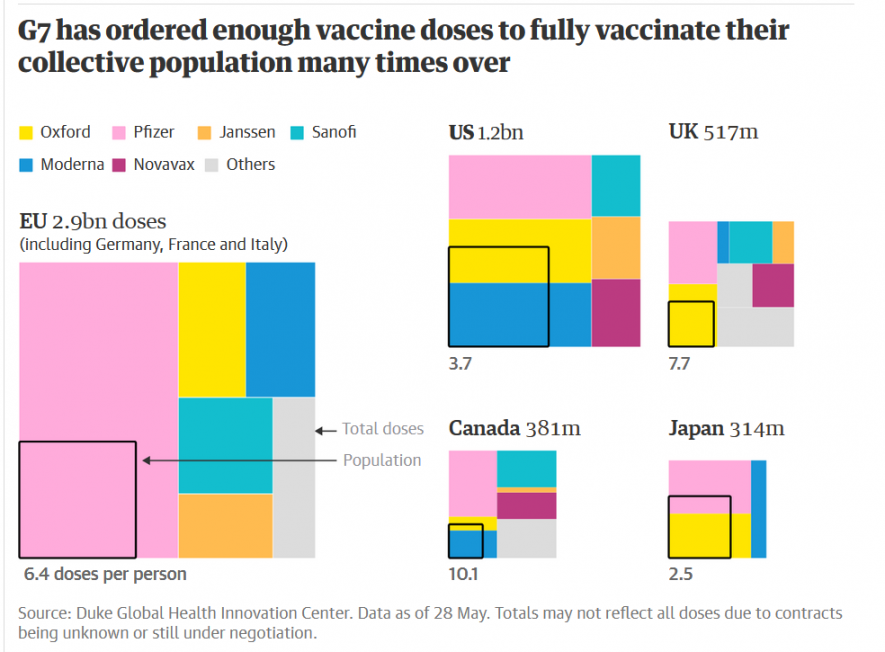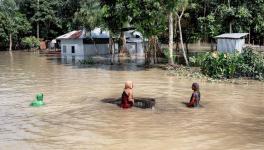Negotiations on TRIPs Waiver Reveal Limitations of Global Structures to Address Covid-19 Pandemic
Representational use only.
The pandemic crisis in India did not allow the government to accept the invitation to the G7 summit that concluded on Monday at pristine beach in Cornwall, England. India's unavailability reflects the reality of the world. Only the G7 Nations would be able to have experience talks without masks and have beach walks during a global pandemic. The final communiqué of the summit is full of commitments and pledges, including vaccine donations, more funding for the COVAX facility and strengthening of the World Health Organization (WHO), among others.
The WHO has indicated that the world needs 11 billion vaccines to vaccinate 70% of the global population. G7 nations pledge on providing 1 billion doses, of which half comes from the United States. However, in the absence of sharing the know-how behind the COVID-19 vaccine, it is unclear how to meet the vaccination targets.
When the COVID-19 outbreak signalled a devastating crisis in early 2020, the international community, including governments of developed economies and civil society organisations, responded to the crisis by prioritising vaccine development. As a result, currently, there are seventeen vaccines authorised by at least one national regulatory body. One of the significant collective responses to fight COVID-19 has been developing the COVAX facility that ensures equitable vaccine allocation with a target of 2 billion doses for 92 of the world's poorest countries. However, the limited vaccine supply is persisting vast inequalities in vaccine distribution, presenting a significant challenge to achieve global population immunity. COVAX has only managed to meet 4.1% of its target (83 million vaccines). These indicators raise questions and mirror the failing reality of the only global solution for equal distribution of COVID vaccines.
COVID-19 pandemic is the biggest economic and social crisis of a lifetime. The developed countries have proved that the vaccines work well in bending COVID-19 curves. While some of them have started everyday life without many restrictions, a large part of the world is still battling with the pandemic with no hope of normalcy. As COVID-19 makes its rounds, developing countries like India will continue to top records of the pandemic. The waves don't seem to stop any time sooner. As we look for solutions to end the pandemic, all attention rotates around the manufacturing, availability and access to more and more vaccines.
The fact remains that developing countries, in the absence of vaccines, continue to be vulnerable to COVID-19 waves, including the countries that have progressed in reducing the infection rates. Thus, the availability of vaccines remains a bottleneck impeding the progress and, therefore, the way out of the pandemic.
There can be many answers to the question that why there are not enough vaccines. An in-depth diagnosis of this problem reveals insufficient manufacturing of vaccines as the root cause. Based on the above argument, the proposal by India and South Africa to the World Trade Organization (WTO) on waiving the Trade-Related Aspects of Intellectual Property Rights (TRIPs) comes as a hope in addressing the vaccine shortage; this is hopeful especially at a time the global solutions are fragile, and the role of international organisations such as the World Health Organization (WHO) is overshadowed by the political agendas of the powerful countries. Unfortunately, the G7 summit statement had not responded to the global demand on the TRIPs waiver, which would allow scaling up the vaccine production and addressing emerging variants. The Intellectual Property Right (IPR) has created a significant limitation to manufacture more vaccines.
Further, data is instrumental in reading the signs of times,
-
45% of all vaccine doses administered so far have gone to just 16% of the world population, which lives in high-income countries. Why? Because they have bought a disproportionate share of early doses. (Source: Our World in Data)
-
As of June 12, 2021, Israel and the USA lead the vaccination programmes by vaccinating more than 50% of their populations (2+doses); meanwhile, India has managed only 3.3%, the Philippines 1.5% and South Africa 0.81%. (Source: Our World in Data)
-
At the same time, Studies predict that the poorest 92 countries will not be able to vaccinate at least 60% of their population until 2023 or beyond. The current status of COVAX targets supports this argument.
In this context, the TRIPs waiver has enormous possibilities to let the world access more vaccines and live everyday life while rehabilitating from all the economic and social losses, just as the countries that oppose the waiver.

The same governments that supported international structural responses, such as COVAX, failed to recognise the crisis as an emergency over their profits and short-term gains. The developed countries have hoarded vaccines as advanced purchases with closed eyes on the role of COVAX. The same countries announced last week at the G7 summit that they are donating vaccines. How does taking more vaccines than needed from those who deserved it and returning them make it a donation? Or how is it vaccine diplomacy?
Why was the Intellectual Property of the vaccines not addressed by the world leaders and organisations while creating global solutions for COVID-19? Was it purposely neglected so that the pharmaceutical giants are not disturbed and can ensure more than enough vaccines to the world's powerful? When the TRIPs can be amended and waived in exceptional cases, why are few countries hesitant to stop millions of people from dying and suffering?
Temporarily waiving patent monopolies will not end all the future innovation to develop vaccines and drugs. The proposal is specific to the COVID-19 vaccine and its related medications for a maximum of three years only. The cost analysis of OXFAM indicated that if the IP rights are waived, the developing countries can be vaccinated at an estimated cost of US$ 6.6 billion. In contrast, if the TRIPs waiver proposal never sees the light, the cost of vaccinating the populations of low and middle-income countries could reach US$ 80 billion. Rich countries and big pharma need to acknowledge that their inaction on vaccine equity will cost lives while their action will not incur any loss.
No economy is an island. The findings of the National Bureau of Economic Research in the United States confirms that if developing countries manage to vaccinate at least half of their population by mid-2021, the global economic loss will amount to US$ 4 trillion, which confirms to be much higher considering the failed targets of vaccination programmes. On the other hand, the estimated global economic cost of not vaccinating the citizens of developing countries would be nearly US$ 9 trillion.
Even after months of advocacy, the TRIPs waiver proposal has just managed to initiate the discussion on a text-based process that India is demanding to end by July. The global dynamics unfolding day by day related to the response of the pandemic indeed mirror the fragility of the international structures that the majority of the world depends on for solutions. If this dependency continues in this manner, the global south will continue to lose economic and social capital and people's lives.
By now, it is clear that the current so-called collective structures are not efficient in addressing the deadly crisis. COVID-19 pandemic had given the world the best opportunity to test the existing structures, which often are disconnected from reality. Delaying to address the root causes of the increasing COVID-19 deaths and infection rates indicates that our leaders are losing the opportunity to rewrite what works best for humanity. It is high time to acknowledge that most of the regional structures, the South Asian Association for Regional Cooperation (SAARC), the African Union (AU) and others, are weaker. They tend to depend on the Global North and the politics of international organisations, WTO, G7 and powerful bilateral agreements across the world.
This pandemic is only the starting of a much more deadly crisis. Relaying and hoping that current structures may bring solutions to the pandemic will only persist in collapsing economies, social systems and killing more people. As most of the world struggles to convince the powerful prolongs, it is critical to innovate structural solutions based on trust, reciprocity, and collective action to address the global crises that continue to come along the way.
-----------------------------
(Meenuka Mathew is a teaching and research fellow at School of Government & Public Policy, O.P Jindal Global University, India. Views expressed are personal.)
Get the latest reports & analysis with people's perspective on Protests, movements & deep analytical videos, discussions of the current affairs in your Telegram app. Subscribe to NewsClick's Telegram channel & get Real-Time updates on stories, as they get published on our website.























